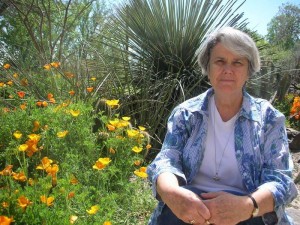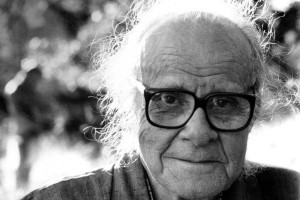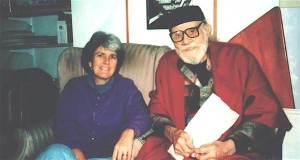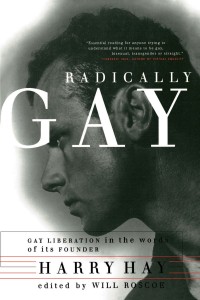
Recently I had the opportunity to sit down for a conversation with Sally Hay, an LGBTQQI (Lesbian, Gay, Bisexual, Trans*, Queer, Questioning, Intersex) rights activist that has done a significant level of research and work regarding elder issues with Services & Advocacy for GLBT Elders (SAGE). As the Baby Boomers continue to retire and age, a whole generation of people who came out before and immediately after Stonewall will face a variety of unique challenges their heterosexual counterparts do not.
As one example, many of these elders adamantly refuse to use the Q for queer in describing their community due to a legacy of great pain and anguish that word caused them as younger people. A younger generation in the late 1980’s and 1990’s, in the midst of the absolute catastrophe of the HIV/AIDS epidemic, re-appropriated the word and turned it into a radical pride label. In a famous leaflet, they wrote:
Ah, do we really have to use that word? It’s trouble. Every gay person has his or her own take on it. For some it means strange and eccentric and kind of mysterious […] And for others “queer” conjures up those awful memories of adolescent suffering […] Well, yes, “gay” is great. It has its place. But when a lot of lesbians and gay men wake up in the morning we feel angry and disgusted, not gay. So we’ve chosen to call ourselves queer. Using “queer” is a way of reminding us how we are perceived by the rest of the world.
These sorts of conversations are genuinely meaningful but also entail a good deal of nuance. Many of these elders do not have connections with their family of origin and as a result often will find themselves being given assistance by younger community members that use queer as an appellation of pride. This is a generation where “their safety was everybody else’s silence.” Studies have begun to show that these elders are “far more reluctant to access traditional, mainstream health services [and] senior services. They put off, they defer healthcare for fear of discrimination, for fear of being harassed, of needing to out themselves, often they don’t out themselves, and also often because they don’t have the insurance [because] that’s a cohort that has a lower income”.
“In terms of working with healthcare facilities and providers, we’ve heard stories over the years…of some discrimination and inappropriate treatment. But on the balance, I think most of the…harm that’s done is out of ignorance. What we hear…the three things are we don’t have any gay people here, we hear ‘we must be doing it right because we don’t get any complaints’ and trying to help them understand that this is a cohort that has survived by being invisible and not rocking the boat… They’re not likely to come up to the administration and say ‘I think I’m being harassed’. And the third thing is ‘we treat everybody the same’. And that comes with a good heart often but not understand that…when you an intake form…that says ‘married/widowed/divorced/separated/single’, even though I am now married, I don’t related to that and when I see that simple array, I know you don’t see me… If all your pictures and brochures are of heterosexual couples and families, you’re saying that you don’t see me.”
Throughout our conversation, we reflected on her ideas about elders, feminism, and the advancement of the struggles for liberation that she and her wife have lived through. Of particular interest was her ability to discuss whether the feminist movement, like the LGBTQQI movement, has entered into a phase of assimilation. I also afforded her the opportunity to directly address doctors and other healthcare professionals about what they should do to better care for this population.

One of the figures who informed some of her efforts and experiences with this elder community was working with her late uncle, Harry Hay, in his last years, who was arguably the founder of American gay men’s liberation. In 1948, Hay, a member of the Communist Party USA, used the Marxist-Leninist definition of a minority to form what became America’s first gay men’s civil rights association, the Mattachine Society. Stuart Timmons, author of The Trouble With Harry Hay: Founder of the Modern Gay Movement, writes in his 1990 biography:
Since 1941, Harry had taught Stalin’s four principles of a minority; these were a common language, a common territory, a common economy, and a common psychology and culture. “I felt we had two of the four, the language and culture, so clearly we were a social minority.” This concept of homosexuals as a minority would be the contribution of which Hay was proudest… He suggested a comparison of the political manipulation and murder of homosexuals in Nazi Germany to recent firings of gays by the State Department [during the McCarthyist Red Scare].
Hay says elsewhere in the Timmons biography:
The post-war reaction, the shutting down of open communication, was already of concern to many of us progressives. I knew the government was going to look for a new enemy, a new scapegoat. It was predictable. But Blacks were beginning to organize and the horror of the holocaust was too recent to put the Jews in this position. The natural scapegoat would be us, the Queers. They were the one group of disenfranchised people who did not even know they were a group because they had never formed as a group. They – we – had to get started. It was high time.
Throughout his life, as Sally says in the interview, Hay described himself as the Martin Luther King, Jr. of the gay movement. While I understand the logic, I would instead argue that Hay was closer to W.E.B. Du Bois for several reasons.

 First, like Du Bois, Hay wrote a large body of work that was based on sociological and anthropological scholarly forms. Second, like Du Bois, Hay was an unrepentant atheist and Communist whereas Dr. King was a Christian and registered as first a Republican and then a Democrat. Third, both Du Bois and Hay were militant throughout their careers with issues regarding collaboration with mainstream politics and always strove for liberation as opposed to integration, whereas Dr. King learned a hard lesson about this after being disappointed by the Kennedy brothers and Lyndon Johnson. Finally, Hay and Du Bois both died as elder statesmen of their respective movements while Dr. King was killed just as he was beginning to formulate a radical critique of not just American racism but imperialism, militarism, and capitalism. Hay continues to be a revolutionary thinker because he included an essential element of class in his identity politics project and challenged not just homophobia and sexism but also capitalism, imperialism and racism.
First, like Du Bois, Hay wrote a large body of work that was based on sociological and anthropological scholarly forms. Second, like Du Bois, Hay was an unrepentant atheist and Communist whereas Dr. King was a Christian and registered as first a Republican and then a Democrat. Third, both Du Bois and Hay were militant throughout their careers with issues regarding collaboration with mainstream politics and always strove for liberation as opposed to integration, whereas Dr. King learned a hard lesson about this after being disappointed by the Kennedy brothers and Lyndon Johnson. Finally, Hay and Du Bois both died as elder statesmen of their respective movements while Dr. King was killed just as he was beginning to formulate a radical critique of not just American racism but imperialism, militarism, and capitalism. Hay continues to be a revolutionary thinker because he included an essential element of class in his identity politics project and challenged not just homophobia and sexism but also capitalism, imperialism and racism.
In 1983, the late Vito Russo, who would later go on to author the classic study of cinematic representation The Celluloid Closet, produced for New York public television a program titled Our Time. The premiere episode featured an interview with Harry Hay and Barbara Gittings, the co-founder of The Daughters of Bilitis, America’s first lesbian civil rights group, along with historian John D’Emilio, whose book Sexual Politics, Sexual Communities dealt with the history of the liberation movement in America. Those interested in seeing just the Harry Hay segment can click here or they can advance the video to the 8:06 time marker.
A BRIEF ASIDE ON NAMBLA
There is something fundamentally sexist about turning a piece that is meant to be about cisgendered lesbian talking about elder issues into an extended one about an uncle that was not the center of the conversation. Yet this following issue is vital to parse through. When any journalist writes about Harry Hay, they can sing the praises of his work for gay liberation ad infinitum but also must confront the difficult issue of his advocacy for the North American Man Boy Love Association (NAMBLA), which he was never a member of. Indeed, in 2010, Obama education appointee Kevin Jennings was subjected to a guilt-by-association campaign by the Sean Hannity and others for his previous laudatory statements about Harry Hay. When I went to SCSU with Bella Robinson, the host, Dr. Alan Brown, who has studied LGBTQQI issues throughout his sociological career and has shelves loaded with volumes on different aspects of the topic, including the aforementioned Stuart Timmons biography, tried to talk with me about this in a conversation and after several minutes we only could come up with two words, “that’s tough”.
There are two instances in Hay’s life where he advocated on behalf of NAMBLA and both are deserving of a full discussion. The latter, in 1994, is much easier to explain. Will Roscoe says in an anthology of Hay’s writings he edited titled Radically Gay: Gay Liberation in the Words of Its Founder:
In 1994, when Senator Jesse Helms learned that the United Nations had granted consultative status to the International Lesbian and Gay Association (ILGA) and that one of the organizations affiliated with this body was NAMBLA…he introduced a resolution in the Senate to cut off funding for the U.N. until it could be certified that it did not recognize or grant official status to any organization that “promotes, condones, or seeks the legalization of pedophilia.” The resolution passed 99 to 0… [This] coincided with plans for a massive Lesbian/Gay convergence on New York City in June to celebrate the twenty-fifth anniversary of the Stonewall uprising. At meetings held in conjunction with this event, ILGA delegates voted to expel NAMBLA. Hay was prominent in coordinating the opposition… Hay has consistently argued the same points: First and foremost, that we [LGBTQQI people] should not allow our opponents to dictate to us who is and who is not a member of our community. Second, while Hay himself has never been a member of NAMBLA, he was once a young Gay man, well under the age of consent, who sought out sexual contact with an adult man and found it. To call this “child molestation” only stigmatizes homosexuality further and makes it more difficult for young Gay people to make contact with others like them. Indeed, Hay accuses Gay leaders of abandoning youth in their eagerness to cater to Right-wing homophobes.
In a published version of a speech he gave at the time, Our Beloved Gay/Lesbian Movement at a Crossroads, Hay said the following:
When some of us “anti-exclusionists” (a more accurate term than “pro-NAMBLA-ites”) argued that Helms’s remarks were aimed at European groups as well as American ones, ILGA responded by saying, “He has no jurisdiction over Europeans.” In so saying, they exposed themselves as middle-class assimilationists with no knowledge of how ruling-class politics play out in “smoke-filled back rooms.” They were ignoring the fact that the feckless, toothless caricature of a world parliament-the U.N.-needed American money in order to keep going and would do anything to get it! Even though NAMBLA had been one of ILGA’s longest-standing member organizations, ILGA voted NAMBLA’s expulsion… Selling NAMBLA down the river was a short-sighted solution and it obscured the real issue of including and addressing the needs of our Gay and Lesbian youth… NAMBLA was never the issue. The constitutional right of Gay and Lesbian groups to first-class citizenship, of Gay and Lesbian individuals to practice political and spiritual self-determination was. It still is!… Thirty days later, Helms let the other shoe drop. He amended an education bill on its way through the Senate by denying federal funds to any public school district that teaches homosexuality is a positive lifestyle alternative through class work, textbooks, or counseling… Insofar as child molestation is concerned, the most common, yet unrecognized, form is the sexual coercion of Gay and Lesbian youth into heterosexual identities and behaviors. This is practiced daily by the whole national and international Hetero community… This outrageous coercion of Gay kids into heterosexual identities and behaviors is not only sexually abusive, it is a spiritually devastating rape because the child, unknowingly, is led into self-loathing at the same time! [Emphasis in original]
The former instance of Hay’s support for NAMBLA, as discussed in the interview, was not an organizational one, it was ideological. Hay, along with other gay men like Allen Ginsberg, were adamant that the sexual initiation and education of younger gay men by elders was a topic worthy of discussion and important. This is not an isolated instance either, throughout history, going as far back as Plato’s Symposium, there has been an undercurrent of this dynamic. In the instance of Socrates and Plato, a long section of that dialogue included an argument that the relationship between a younger man and an elder was not just admirable, it was holier than heterosexual marriage! There are two points to keep in mind when dealing with this issue.
First, it was not until the 1966 free speech ruling by the Massachusetts Supreme Court regarding the censorship of Naked Lunch by William S. Burroughs that it was fully legal for LGBTQQI writers to talk graphically and without fear about same sex relationships of any kind, before that writers had to use codes and symbols. Within three years of that ruling came the Stonewall riots in the summer of 1969. In 1980, the HIV/AIDS epidemic hit the community with a force akin to how the Shoah struck the European Jewish community. The African American movement had centuries to hash through major issues that still continue to affect their communal discourse. By contrast, LGBTQQI people had eleven years of peace before being thrown into a cataclysm that forced them to confront the military-pharmaceutical-industrial complex, sexism, racism, and so many issues they needed to overcome quickly lest they die horrible, lonesome, painful deaths. This conversation is one of the most challenging for men who have sex with men, more difficult than safe sex, HIV testing, substance abuse, or the notion of marriage as opposed to domestic partnership.
Second, there is a large level of hypocrisy around consent laws regarding same-sex relations. Men and women can and are destroyed by homophobic parents of their lovers who have them arrested for sexual misconduct and tarred as pedophiles if they have been dating someone for years and then turn 18. This happens in the same country where the age of consent to marriage in New Hampshire is 13 for women if the parents consent! There also are Romeo and Juliet laws that protect straight couples when one partner turns 18 that do not apply historically also to same sex couples. As a personal aside, my own view is that the age of consent would probably be best set at 45, in a world where we have so many children abandoned to poverty, war, a pathetic foster care system, and the school-to-prison pipeline, I have no clue why child bearing-aged adults should be allowed to have sexual congress that results in procreation, but then again I never could understand heterosexuality.
I do not deny that this is a difficult conversation for straight allies of the community. On the surface, it seems very apparent that this is a common-sense, open-and-shut case of opposing pedophilia. It is also worth reiterating that both Sally and I agreed to disagree with Harry Hay’s actions. But understanding them fully so to disagree with them properly is what any mature ally should do before passing judgment. Those who profess ignorance and pass judgment beforehand on a figure who defines the very existence of LGBTQQI liberation should perhaps reconsider whether they are actually allies of the community. I would argue not that Hay was right or wrong but that one must educate oneself before passing judgement. The reality is that homophobia has always been based around ignorance and miseducation about LGBTQQI people and their lives.
Harry Hay was ahead of his time in almost every way. His ideas about Left wing strategy in the community were proven correct when ACT-UP would use direct action anarchist tactics to fight back against the horrors of AIDS. His notions of assimilation as a threat continue to be borne out as a class-free, homogenized history of liberation is offered up by films like the recent STONEWALL film. Despite a single place where he may have erred, all LGBTQQI can continue to learn something from him.



Deprecated: Function get_magic_quotes_gpc() is deprecated in /hermes/bosnacweb08/bosnacweb08bf/b1577/ipg.rifuturecom/RIFutureNew/wp-includes/formatting.php on line 4387
Deprecated: Function get_magic_quotes_gpc() is deprecated in /hermes/bosnacweb08/bosnacweb08bf/b1577/ipg.rifuturecom/RIFutureNew/wp-includes/formatting.php on line 4387
Deprecated: Function get_magic_quotes_gpc() is deprecated in /hermes/bosnacweb08/bosnacweb08bf/b1577/ipg.rifuturecom/RIFutureNew/wp-includes/formatting.php on line 4387